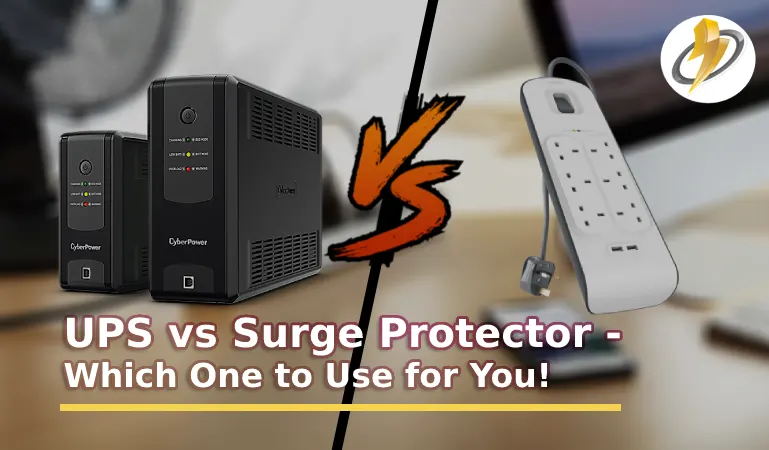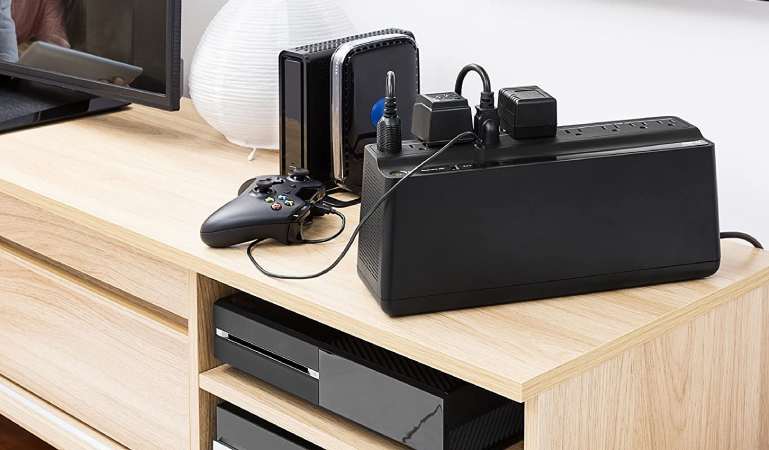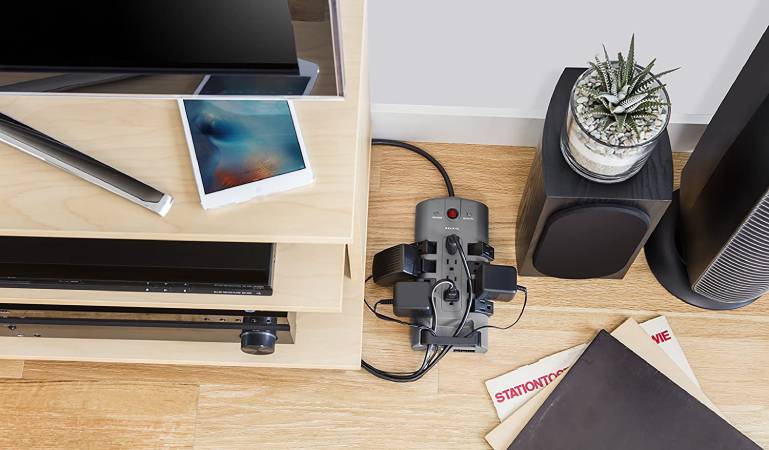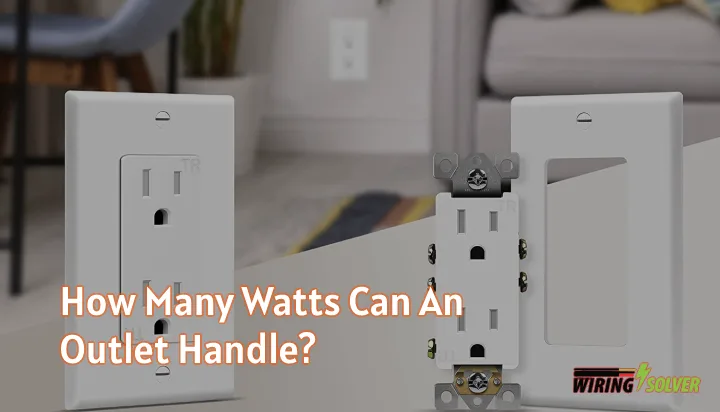Most of personal computer (PC) users are aware of the dangerous effect of power surge, blackout, or other sudden loss of electricity on the electronic device. To protect the device against them, you’ll find different protecting devices including UPS and surge protector.
But, what’s the difference between them and which one you should use?
A surge protector or suppressor stands against surges or high-voltage spikes that may damage your electrical system permanently.
On the other hand, an uninterruptible power system (UPS) works as a second-level protection device against surges by regulating incoming voltage and providing power to the device even if the power supply is cut.
This article comes with a detailed comparison between UPS vs surge protector so that you can get the right one for you to protect your equipment.
Before start with the article, here’s a comparison chart between UPS and surge protector.
| Remarks | Surge protector | UPS |
| Function | Protects devices from instant high-voltage surge | Protects from the affect of comparatively reduced voltage surge |
| Level of Safety | Primary | Secondary |
| Power | Doesn’t power devices | Powers the device when power is cut |
| Battery | No battery is required | Incorporates battery |
| Recommened Device | TV, Monitor, Wi-Fi router, Printer | PC, Server |

The function of a UPS
Even if a power surge doesn’t destroy anything immediately, the high-voltage spike may cause the permanent failure of the components with time. And, it is important to remember that such damaging surges happen very frequently as compared to power outages.
That is why a robust backup power system should be cascaded to add protection against surges which is known as UPS. While surge energy is mitigated by a surge protector, a UPS reduces the remaining energy to a tolerable state.
A UPS acts as the “backup electricity” when a power outage occurs. It provides you sufficient time to save all of your documents properly and shut down the computer in the event of a sudden blackout.
The UPS battery usually backs you up for about two years or so. However, if the device is exposed to high temperatures or heat, the lifespan will be significantly reduced. This also occurs if it needs to discharge the battery frequently when a regular power outage takes place in your area.
Usage
A UPS is mostly used with personal computers. It also is used with Wi-Fi routers, printers, photocopy machines. It lets you finish and save the documents you’re working on before shutting down the device properly.

1. APC UPS Battery Backup and Surge Protector
The APC UPS comes with a 600VA / 330W sealed lead acid battery. It works as surge protestor as well. It lets you stay connected to internet even when power goes out. The Uninterruptible Power Supply is one of the best devices to protect your data and keep you connected.
2. CyberPower CP1500PFCLCD
The 1500VA/1000W PFC sinewave UPS is designed to support active PFC and conventional power supplies. It includes a titlting LCD panel that displays detailed battery status, potential issues. The automatic voltage regulation also helps increase the battery life.
3. Vertiv Liebert PSA5
This UPS comes with automatic voltage regulation (AVR) to deal with electrical disturbances without using battery power. It also provides conditioned power to equipment and extends their battery life. It includes ten outlets with five surge protected outlets.
How Does the Surge Protector work?
The function of Surge Protector
A surge protector is generally placed into electrical extension cords which commonly consist of a varistor. The small device shunts an instant high voltage spike to prevent it from reaching up to the electronics. That’s how it saves the expansive electronics from being damaged
You can compare a surge protector with a shock absorber of a vehicle. The way a shock absorber saves expansive parts of the vehicle in case of an accident, a surge protector saves the PC or other devices in the same way when power surges occur.
Usage
Surge protectors protect your devices from power surges with very high voltage. But the regular voltage surges occur anytime and anywhere such as national grid load balancing or right after a power outage. A surge protector could be an inexpensive investment that would protect the devices.
However, you must replace the varistors when they burn out. There’s a rating placed which specifies the maximum current it can withstand before getting burnt out.

1. Amazon Basics 8-Outlet Surge Protector
The amazing surge protector has 8 outlets that keep your devices protected from power surges with fireproof MOV technology. The power on/off switch is connected with a circuit breaker. The heavy-duty cord is 6 ft long with 3-prong plug.
2. Anker Power Strip Surge Protector
The long surge protector comes with 12 AC outlets and is equipped with two 4000-joule surge protectors. It also includes an overloaded protection, a grounded protection, and a fire-resistant exterior.
3. APC Surge Protector
It is a 3020-joule surge protector with 11 total power outlets. The cord is 8 ft long with the capability to rotate 180 degrees.
Which One to Use?
You need to protect sensitive electronic devices from sudden power disturbance in order to make sure they run smoothly for a long time. Large appliances such as microwaves, refrigerators, lamps, fans, and coffee makers can withstand power disturbance up to a certain level.
On the other hand, devices such as computers, servers, monitors, printers, routers need to be protected. When it comes to deciding between UPS with AVR vs surge protector, you should consider which device will suffer from data loss when a power cut occurs. It should be the computer and server.
If you’re interested, you can also see Power conditioner vs surge protector.
Frequently Asked Questions (FAQs)
1. Is a UPS better than a surge protector?
There’s no way you can determine which one is better than which as they both serve different functions. A surge protector protects the electronic devices from sudden high-voltage surges, while a UPS provides power when a power cut occurs.
2. Will a UPS protect against surges?
Yes, it does. When a surge occurs, it comes directly to the UPS before hitting the devices it is connected to. A UPS protects surges up to a certain level.
3. Can a UPS act as a surge protector?
A UPS protects electronic devices against most overvoltages as a surge protector does. It also provides continuous power in case of a blackout. It allows you to save your documents and shut down the device properly.
4. Can a power surge damage a UPS?
The high voltage from surges can damage any electrical equipment including a UPS. However, a surge protector disconnects the devices in case of a power surge. So, a surge protector is required to save all electrical devices including the UPS.
Conclusion
Surge protectors keep the sensitive electronic devices protected from power surges. On the other hand, UPSs safeguard your unfinished documents and protect against surges as well.
I hope this article helps you determine the differences between UPS vs surge protector. Now it’s your call to choose the right one for you.



![Belkin Surge Protector is Not Working!! [Solved]](https://wiringsolver.com/wp-content/uploads/2022/07/Causes-Behind-a-Belkin-Surge-Protector-Not-Working.webp)

![Chassis Wiring Vs Power Transmission Wiring [The Diferences]](https://wiringsolver.com/wp-content/uploads/2022/01/Chassis-Wiring-Vs-Power-Transmission-Wiring.webp)
